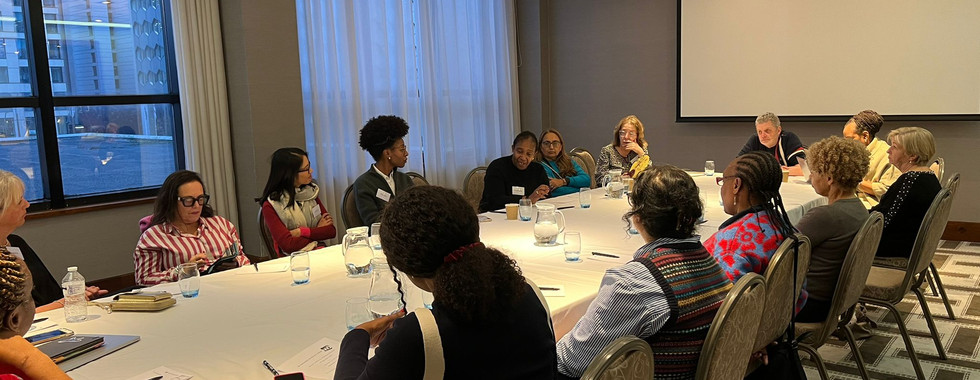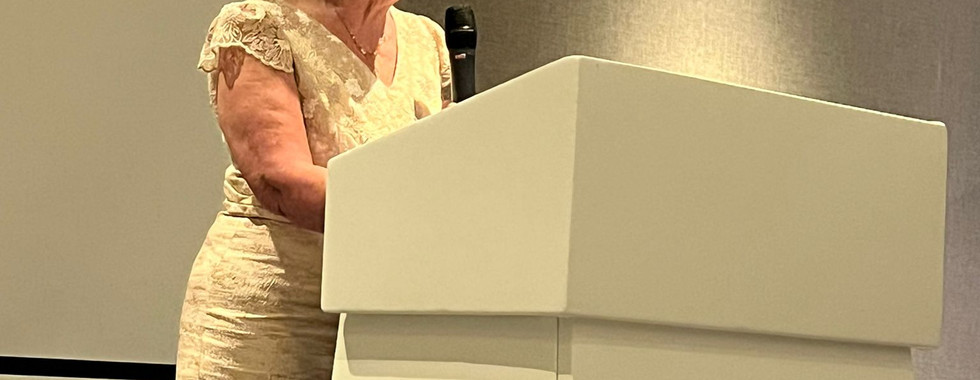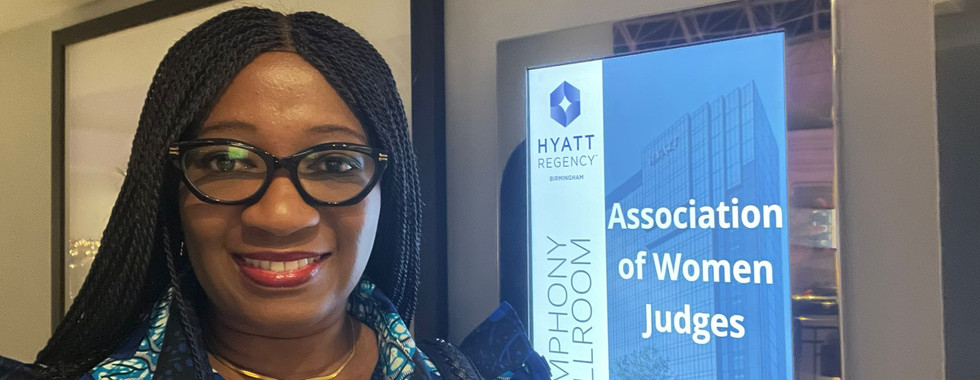The Birmingham Diary: United Kingdom Association of Women Judges.
- J. Jarpa Dawuni, Ph.D.
- Nov 22, 2024
- 4 min read
Updated: Nov 25, 2024
Bold. Brilliant. Beautiful.

The United Kingdom Association of Women Judges held its annual conference in Birmingham from November 14-15, 2024. It was an honor to be invited to deliver a special talk on my work on women judges in Africa, my ongoing NSF-funded study on the Comparative Demographic Variation in Judiciaries, and my forthcoming fifth book, African Women Judges: Storytelling as Judicial Freedom.
The conference opened with a dinner on the 14th at the Hyatt Regency in downtown Birmingham. I was one of the two speakers for the evening, and my talk was titled “Women Judges: Similar Than Different.” I reflected on a section of the introductory chapter in the forthcoming book, African Women Judges: Storytelling as Judicial Freedom, where I shared similar experiences between Judge Gertner in the US and Judge Maya in South Africa. I concluded on this note:
“Women judges share more commonalities than differences. While we avoid essentialist tropes, we must remind ourselves that one thing that binds all women judges—regardless of race, class, ethnicity, rule or other, is this– YOU are all human. You are all in the business of promoting justice. Humanity and Justice are enough to be a binding force for good.”
Following my speech, a Judge from Scotland shared her experience with the mentoring program for Afghanistan women judges. She regaled us with how she came to join as a mentor and the lessons she learned from her mentee judges – the humanity, culture and resilience of the women who had to flee their beloved homes to be in a foreign land.

The second day of the conference started with a keynote speech by Lady Justice Whipple, a Justice of the Appeal Court of England and Wales with a stellar legal and judicial background. Her remarks focused, among other themes, on issues arising under her current leadership position as the Lead Judge for Diversity and Inclusion, Leadership Development and Wellbeing. In her speech, she observed:
“I have been in this position for one year. I oversee a huge portfolio that includes diversity, inclusion, leadership, and well-being. I care about diversity and inclusion and want to work with the best judges. I want to work in an environment that is fair and inclusive. Let’s put our shoulders to the wheel and get it turning—we are ready.”

Barbara Mills, KC, the current Vice Chair of the Bar Council, delivered an inspiring speech. She concluded her speech on this note:
“We have moved from anecdotes to real data. There is now no question that women belong in the legal profession and that they can and should lead. Here’s to the next hundred years; we can all do our part individually and collectively. As I take over on January 1, 2025, as the fifth woman and the first person of color to chair the Bar Council, I will be informed by the knowledge and understanding that meaningful and sustainable change will happen not through force but through leadership and partnership—collaboration and persuasion. I hope you will join me on this journey.”
Bold:
This conference reaffirmed my belief that women judges are bold—justice delivery requires boldness and resistance to social injustice, discrimination and social norms. Being among women judges, listening to their stories, hearing their laughter, and watching them hug each other, eat and drink reaffirmed my belief that the women judges are as human as we all are. As shared in the introductory chapter of Layered Intersectionality and Framing Feminist Legal Discourse on Access to Justice for Women, the women judges I study are not just objects of law or justices of the peace. Women judges are human beings who feel, see and sense all human emotions and have shared intersectional experiences that cut across gender, race, ethnicity, class, sexuality and other identity categories. Hearing these remarkable women judges speak about their work, experiences, challenges and triumphs was inspiring. It was beautiful to listen to the honest conversations about the impact of racism and sexism they encounter in their daily work and how they radically resist misogyny, patriarchy and racism.

Brilliant:
Women judges have the brilliance needed to do the work. Despite historical exclusions from the bench, unmeritocratic selection methods and social norms such as racism and sexism that excluded women from the bench, women judges have proven they have the brilliance and intellect and are equally qualified (and often more qualified) to sit on the bench. These are demonstrated daily through their decisions/judgments and other activities off the bench.

Beautiful:
Women judges are beautiful—inside and out. The gorgeous dresses, smiles, stories, and shared experiences conveyed a sense of collective beauty and camaraderie. It was lovely to watch as they interacted with each other and the commitment to self-care and wellness, as exemplified by the breakout sessions on dealing with grief and self-defense classes offered.
Drying the ink
During these two days, I reaffirmed my role as a researcher and scholar-activist—to tell the stories of judges—through rigorous research methodologies accompanied by strong theoretical frameworks. Furthermore, being among the women judges also ignited a renewed sense of commitment to tell the authentic stories of these women judges through the power of the pen and their voice(s). Through legal narratives and storytelling, I tell the authentic stories of women judges, starting from the African Women in Law Legacy Project to the Women in the African Diaspora Project. Watch out for more storytelling. As I concluded in the introduction chapter of my forthcoming book- African Women Judges: Storytelling as Judicial Freedom, “one never knows what theories are uncovered during storytelling. The art of storytelling and the dialogic of communicating one’s lived experiences is the first step to building knowledge and theory. Judicial storytelling is an act of freedom.”
Until next time…............




































